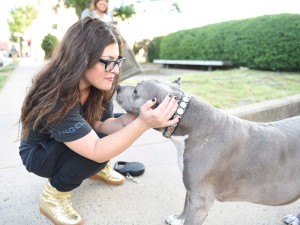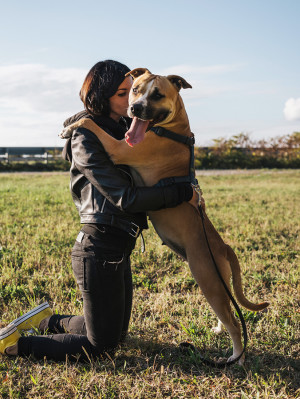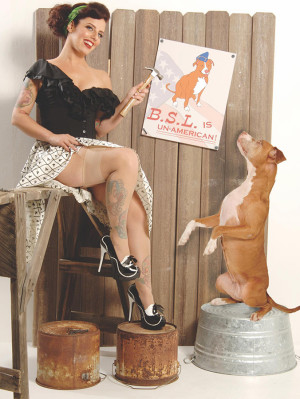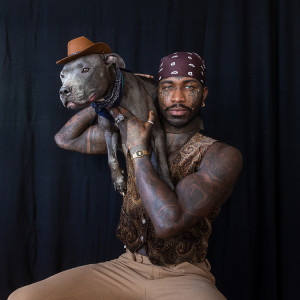The Pit Bull-Advocacy Doc “Saving Jones” Isn’t Just for Dog Lovers
Actress and comedian Rebecca Corry wants to heal society’s messed up relationship with Pit Bulls—starting with this movie.

Share Article
If there’s one thing Rebecca Corryopens in new tab wants people to know about her documentary, Saving Jonesopens in new tab, it’s that you don’t need to love dogs or Pit Bulls in order to watch it. In some ways, it’s more important that people who aren’t big dog people see the film.
“I want people to know that this is not just a ’little doggie movie,’” Corry told us during a recent interview. It’s much more than that.
Saving Jones premieres in Los Angeles at the Dances With Films Festivalopens in new tab on Saturday (buy tickets hereopens in new tab!) and is inspired by Jones, a dog Corry saw abused as a child. It’s a deeply personal story about the relationship between dogs and humans. The film examines how our society treats dogs like disposable property instead of sentient, emotional beings, and it urges viewers to consider what that says about us as a species.
Specifically, the documentary deals with the discrimination and abuse that Pit Bull-type dogs face — a cause that changed the trajectory of Corry’s life after fostering (and then, of course, adopting) her beloved dog Angel.

It all started with Angel.
When Corry first agreed to foster Angel in 2008, she witnessed firsthand the mistreatment dogs can face. Angel’s ears were butchered, and she had a massive chemical burn down the center of her back. Even so, this precious velvet hippo, aka Pit Bull-type dog, with gentle eyes remained true to her inherent goodness. As Corry puts it, “She was magical. She was like no other.”
Angel had just gotten knee replacement surgery when she and Corry first met; she needed a place to heal, away from other animals. Naturally, what was meant to be a temporary stay soon became permanent. “After I had her for, like, three weeks,” Corry admits, “I decided to keep her.”
Corry’s first childhood dog, Jones, also had a rough life. Corry’s father found the fluffy Shepherd mix during a family trip at a gas station that was giving him away. Jones only lived to about four years old and endured abuse, neglect, and suffering during his short life— a harsh reality Corry says she’s carried with her her entire life.
“I didn’t realize until I was about 48 years old that the real reason I do what I do is because of the trauma that I experienced with Jones,” she says. “Angel was a catalyst, and Jones is the reason.”
And it led to Stand Up for Pits and a lifetime of advocacy.
After adopting Angel, Corry began producing live comedy shows called Stand Up for Pitsopens in new tab starting in 2011. In 2013, she took things a step further by creating the Stand Up for Pits Foundationopens in new tab, a nonprofit dedicated to educating humans about Pit Bull-type dogs, advocating for their rights, and saving their lives.
In 2014, Corry organized her first One Million Pibble March on Washingtonopens in new tab from her one-bedroom apartment. She wasn’t sure if anyone would show, but sure enough, people turned up by the thousands. It was a moving sight for Corry. “I was proud of people,” she says. “I was proud of my species, when most of the time, I’m not.”
Saving Jones, which took six years to make, is an extension of Corry’s long journey as an advocate — a reflection of how Jones and Angel have illuminated her purpose. At the same time, making the film brought its own challenges. Crafting a complex story into a 100-minute narrative is hard enough. And then, there’s the personal aspect to contend with.
“It makes me extremely uncomfortable,” Corry says of the filmmaking process. “Because I’m a very private person. I’m not one of those people that sort of blurs the line between my personal life and the cause. ... But, you know, with a documentary film, in order to be effective, you have to tell the story — the whole story — and you have to tell the truth, which every word and moment of this film is. This is the hardest thing I have ever done personally and professionally.”
Saving Jones is a tribute to Angel, Jones, and all rescue dogs.
Still, Corry decided that Saving Jones is a story worth telling because it, without question, has the power to educate those willing to learn and inspire others to take up the cause and save more Pit Bull-type dogs. To that end, she says, it’s crucial for viewers to understand that this is a project that needs to be taken seriously: “This is about abuse and discrimination to a type of dog as it directly relates to humans.”
As far as Corry is concerned, dogs are a gift to humanity — one that society frequently squanders by thinking of them only as “property” rather than as complex, living beings with thoughts, souls, ideas, and memories. To see these creatures routinely “thrown away like garbage” stokes a unique anger. That’s where the social commentary aspect of Saving Jones comes in.
“How fucked up and broken are we as a species to do that?” Corry says. “I think that everything that’s happening to them is wrong, and I think everything about it is humanity’s fault.” Looking back, Corry credits Angel with changing the trajectory of her life. When Angel died in 2016, she says she was devastated. She still remembers the exact date: April 2. “It feels like it happened yesterday, and then it feels like it happened in another lifetime,” Corry says. “It was absolutely excruciating. I truly thought I would stop breathing.”
Since losing Angel, Corry has become the personal assistant to two other Pit Bulls, Sally and Todd, who are alive today because of the SUFP Foundation. During our interview, she jokes that she’s been “working for” her dogs for eight years. And at the same time, she recognizes that even they have only come into her life because of the path her time with Angel set her on.
“I feel really lucky to have shared my life with her for that period of time,” Corry says. “Even though it was way too short … I would go through it a million times over and over, because millions of dogs are being helped and saved because she lived.”
Saving Jones premieres at the TLC Chinese Theater in Hollywood on Saturday at 4:45 p.m. PT.

Laura Bradley
Laura is a New York-based experienced writer and mom of two rescue pups. Her work has appeared in Slate, Vanity Fair, Daily Beast, The Washington Post, The Atlantic, Yahoo! News, Vulture, Grazia Magazine, and more. When she is not writing or walking the pooches, you will probably find her in the community garden.
Related articles
![Couple hugging their Pit Bull]()
What Is a Pit Bull, Exactly?
Everything you need to know about the five breeds dubbed “Pit Bulls.”
![Deirdre Franklin dressed as a pinup model holding one of her calendars while sitting on a wooden table next to a Pitbull dog sitting on its hind legs looking up at her]()
Pinups for Pitbulls Rolls Up the Victory Curls For the Pups Who Need It Most
Back in the day, pinup models donned their victory rolls to boost wartime spirits. Now, they do it to advocate for a much-maligned dog breed. Deirdre Franklin, the founder of Pinups for Pitbulls, explains how a burlesque hobby evolved into a life-saving non-profit.
![Happy couple and their pit bull dog together.]()
News Outlets Recklessly Give Pit Bulls a Bad Rap—Yet Again
Following the death of a California man last week, headlines only did further harm to Pit Bulls’ reputation.
![2 cute pit bull dogs laying next to each other on a blanket]()
BSL is Just Plain BS
Breed-specific legislation has profound impacts on families, their dogs, and animal welfare professionals.
![Couple hugging their pit bull]()
The Good Fight: New York Takes Steps to Squash Breed-Specific Legislation
Under the new animal-welfare laws, insurers will no longer be able to discriminate against pet parents of certain dog breeds.
![Yves, a man with a lot of tattoos and a brown paisley head bandana in tan pants holding his grey Pitbull dog who is wearing a tiny cowboy hat over his shoulder]()
The Misunderstood Pit Bull Is at the Top of Yves’s Advocacy List
The model, activist, and musician on his activism philosophy: “I’ve always been drawn to those who have been left behind, forgotten, misunderstood. I relate to them on a very deep, personal level. No matter how different you are, everyone deserves a chance.”








